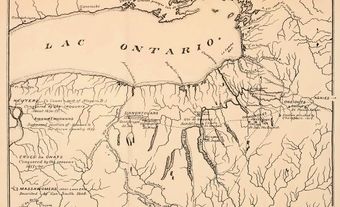Though educated in law, Calvin published a short manual of religious instruction, Institutes of the Christian Religion, in 1536, 2 years after leaving the Roman Catholic Church. Later he enlarged the Institutes several times until it became a major theological treatise adopted by most Reformed churches; it also influenced Lutheran and Anglican theology.
As a theological system Calvinism presents a comprehensive view of how human life should be properly ordered, personally, socially, ecclesially and politically, according to the sovereign will of God. Among the important elements of Calvinism are the following: the authority and sufficiency of Scripture for one to know God and one's duties to God and one's neighbour; the equal authority of both Old and New Testaments, the true interpretation of which is assured by the internal testimony of the Holy Spirit; the doctrines of God as triune and as creator and sustainer of all things, of Christ the Mediator, whose atonement for sin satisfies the divine justice, and of justification by faith issuing in an ethic that aims to transform every aspect of life.
Later Calvinism became preoccupied with Calvin's doctrine of election or predestination, and with the signs by which the elect can be known, but for Calvin himself predestination is primarily a doctrine of faith's final assurance. Double predestination means that God has already chosen those who are to be saved and those who are to be damned. In this world, however, people achieve fellowship through groups such as the church and the state, which are separate but partners. Both church and state derive their authority from God, but because the church is ultimately superior to the state, a bad government may be deposed by society collectively (not by the action of an individual) if all other remedies for justice fail.
The five principles of Calvinism as formulated by the Synod of Dort (1618-1619) are summarized in "tulip," a popular acronym for total depravity, unconditional election, limited atonement, irresistibility of grace and final perseverance of the saints. Arminianism, a theological proposition propounded by the Dutch Reformed theologian Jacobus Arminius (1560-1609), rejects the later Calvinist doctrine of double predestination by asserting that divine sovereignty is compatible with free will in humans. This belief was generally accepted by the Church of England and Methodism, and became influential in the later development of Reformed theology.
Calvin, a French citizen, was invited to "reform" the free city of Geneva. With the city council's support his puritanical plans to improve morals and religious life were enforced, but Calvin also enhanced popular control of city politics and created a welfare system for the poor, sick and handicapped. Elsewhere Calvinism was denounced as a revolutionary attack on government and religion, and its followers were persecuted until eventually restricted to Switzerland, the Netherlands, France, Hungary, Britain and some German states. Calvinism was first introduced into Canada by French Huguenots and it later flourished among Scottish, Irish, Dutch and New England settlers. By the end of the Victorian period, the Presbyterian Church was the largest Protestant denomination in Canada, the second-largest Calvinist group being the Baptists.
As a public theology, Calvinism has had a truly immense influence on religious, social and political developments, particularly in Europe and North America. Before WWI Calvinism was formative in the program of the Social Gospel movement for religiously based social, moral and political improvements to society. More recently it has influenced Canadian support for humanitarian and democratic developments in emerging nations. The so-called "Protestant work ethic" has been credited rather inaccurately to Calvinism, as have Canadian puritanical views on sexual matters, sabbatarianism, Temperance and individualism, all attitudes shared by most Christian denominations during the Victorian era. A late 19th-century revival of European interest in Calvinism influenced Canadian theological thought by the 1930s through the writings of such "neo-orthodox" thinkers as Karl Barth. Canada has also shared in the Dutch branch of this revival, thanks to the postwar immigration of Dutch Calvinists who have sought to establish Christian-controlled schools and Christian trade unions.

 Share on Facebook
Share on Facebook Share on X
Share on X Share by Email
Share by Email Share on Google Classroom
Share on Google Classroom


